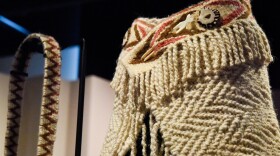Twenty-five years ago this week, a Russian missile tracking ship journeyed into Elliott Bay, inviting Americans aboard for tours and turkey.
It was an unheard of gesture between two countries that had, only a year earlier, been bitter rivals. And it’s part of a new exhibit at the Washington State History Museum.
The Cold War Starts To Thaw
In the mid-1980s, the nation watched as President Ronald Reagan visited Moscow, quoting Russian proverbs to Soviet leader Mikhail Gorbachev.
“Doveryai, no proveryai,” Reagan said, before repeating it in English: “Trust but verify.”
“You repeat that at every meeting,” Gorbachev quipped, drawing laughs from the room.
As the Cold War thawed, then-Washington Secretary of State Ralph Munro watched the events unfold. He remembers, in particular, watching on television as Gorbachev visited Washington, D.C.
“There were, of course, people lining the streets,” Munro said. “They couldn’t believe the Russian leader was in Washington, D.C., and the car stopped halfway to the White House, just a few blocks away. Mr. Gorbachev got out and went around and started shaking hands. My wife and I were virtually in tears.”
Citizen Diplomacy
But the high-level diplomatic efforts are only part of the story about the thawing of the Cold War. This exhibit at the Washington State History Museum is dedicated not to the power brokers, but to the citizens who led their own diplomatic efforts to reach out to Soviet people.
“Yeah, a number of people started to try to develop relationships,” said Munro.
There were a variety of events. Alaska Airlines held what they called “Friendship Flights” in the 1980s, between Alaska and Russia.
There were athletic competitions, including the Goodwill Games in Seattle. Swimmer Lynne Cox swam across the International Date Line at the Bering Strait, from an Alaskan island to a Russian one, where she was greeted by locals.

And then in 1992, shortly after the fall of the Soviet Union, came maybe the strangest event of them all. Ralph Munro remembers getting a phone call from Seattle sports promoter Bob Walsh, the brains behind bringing the Goodwill Games to Seattle.
“He called me and said ‘We’re going to shoot a rocket out of Central Russia, and we’re going to send gifts to the state of Washington,’” Munro said. “And I said ‘Bob, you’re out of your mind. You must be crazy.’”
Bob wasn’t crazy. The capsule would orbit the earth for six days, and then land in the ocean. Oh, and there was more.
Guess Who's Coming To Dinner?
The Marshal Krylov, a 680-foot Russian tracking ship (which news accounts would short-hand as “spy ship”) picked up the capsule off our coast and brought it into Seattle’s Elliott Bay on Thanksgiving week, 1992.
Ralph Munro, his family, and hundreds of others, were going to dinner aboard a Russian spy ship.
“And when this ship came into Seattle, it was just beyond comprehension,” Munro said. “They offered public tours! The Russian consul general told me ‘Ralph, I’ve never been allowed to go NEAR that ship. And now you’re going to have dinner on it?’”
Dinner included turkey, cranberry sauce, potatoes, and lots of Russian dishes.
“They tried to duplicate America,” Munro said. “But after a lot of vodka, everything works out fine.”
Besides the visiting Americans dining aboard the Krylov, news accounts from that week say 400 Russian sailors were hosted for Thanksgiving dinners in homes across the area.
The Chilly Now
Times have changed since 1992. The U.S. and Russian governments are again on difficult terms. There are extreme tensions with North Korea. But if there’s one thing Ralph Munro took away from that Thanksgiving dinner 25 years ago, it’s that individual people can transcend trans-national feuds.
“I think you see citizen diplomacy happening every single day, even when the governments are fighting,” Munro said. “You see individual people out there trying to build a better world and figure out ‘How do we get through this?’”
The exhibit “Glasnost and Goodwill” is on display at the Washington State History Museum in Tacoma through January 21.









